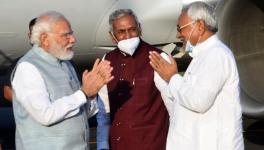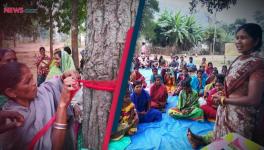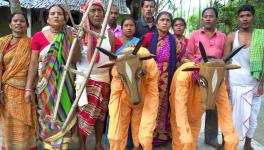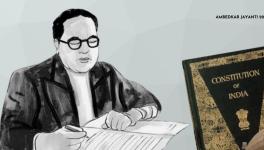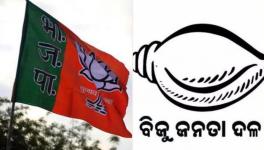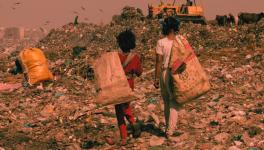Goddess’ Own Children: Dejected and Detached
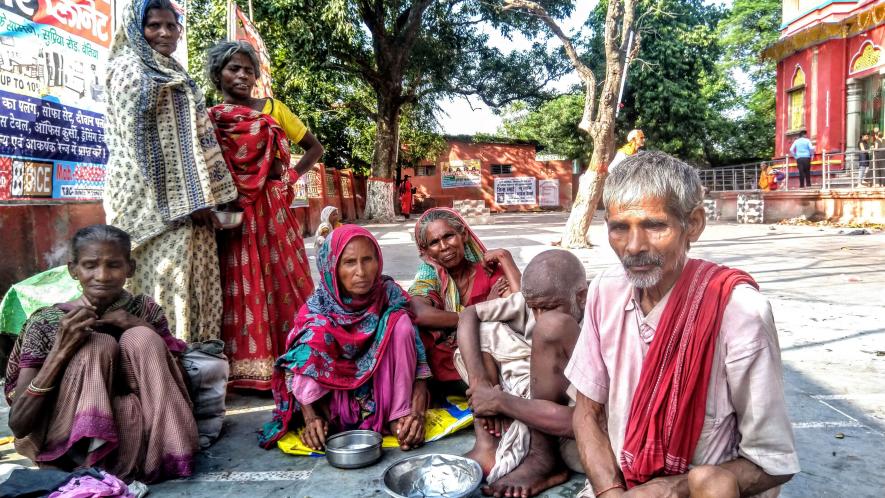
Saeda, Kalawati, Ghunia, Zainam, Fula, Bharat and Rajendra [left to right].
Manturni Devi, 40, has nubbins of skin and soft tissues in the place of fingers. This is apparently a case of symbrachydactyly, a rare congenital abnormality in which fingers or toes fail to develop properly in the womb. Manturni knows a little about her medical condition except the fact that she was destined to live with it. In most such cases, statistical data suggest, children adapt to their limitations. Moreover, Manturni, a Dalit, was married to Jatan Ram of Nawranga locality of Bettiah town. She now has a baby—Mamta, aged 4. Both now sit near the exit gate of town’s famous Durga Bagh temple to beg.
The common proposition attempts to obfuscate the very reality that there might be deep reasons why beggars earn a living by “sponging off others”. This report from a suburban area of poverty-stricken Bihar searches for some of the reasons behind this choice.
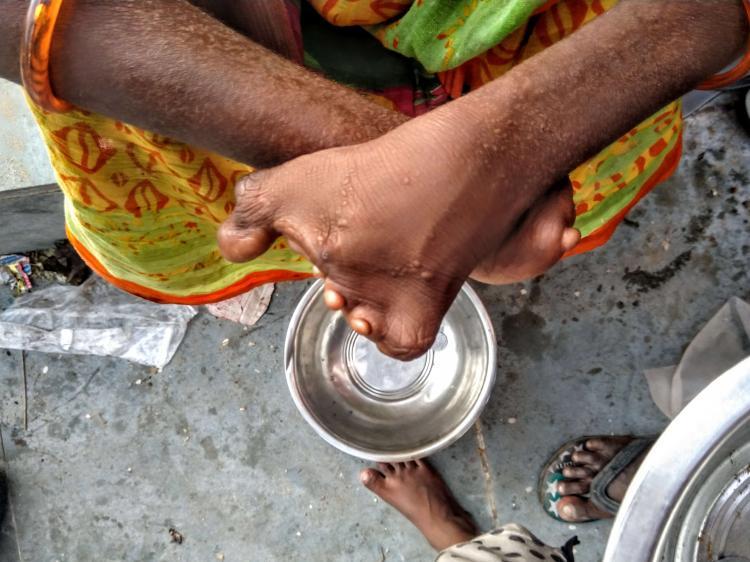
Hands of Manturni and a foot of her daughter Mamta.
“I am homeless and childless,” says Hasimuddin, “Where can I go?” Hasimudddin, a sexagenarian, has only one traditional wooden wheelchair to call his personal property. Hasimuddin prefers to call himself ‘Viklang (disabled)’ over ‘Divyang (specially or differently abled)’. For him and several other beggars here, the polite term does not make any difference. “I live in someone else’s home [in Nawranga]. I can barely walk. There is no proper assistance from the government,” adds Hasimuddin, who, also, belongs to a religious minority community. “Rs. 20”—he rounds off today’s alms.
There were initially 57 homes in Nawranga, which belonged to differently abled people. Shankar Pandit, 65, tells us that the children of many differently abled citizens left the area after they began to earn, hinting at a major social stigma. Shankar Pandit is a leprosy patient. He was infected some 30 years ago. “Kuchhu fund naikhe milat vridha pension ke alawa. Voto bhi deweni…viklang bhi bani…jan dhan bhi ba…koi fayada ba ese (I don’t receive any help from the government, except the old age pension. I regularly vote…I am differently abled…I also got registered with Pradhan Mantri Jan Dhan Yojana or PMJDY…there is no benefit),” says Shankar who receives the aid of Rs. 1,500 per month from an NGO along with Rs. 400 under Bihar Government’s Universal Mukhyamantri Vridhajan Pension Yojna. “Who can survive with Rs. 1,900 for a month? I am unable to perform any physical task. How will I manage my family without money?”
Shankar’s wife Gaudi Devi, too, got infected by the contagious leprosy soon after Shankar’s symptoms surfaced. Shankar lost one of his lower limbs to the disease; he now uses crutches. After Dussehra, Shankar will paddle tricycle [provided by the NGO] across the town asking for alms. “I only do it on Fridays and Sundays. I have grown old…I do not have energy to pull the tricycle daily.”
Gaudi Devi says that MJK Hospital Bettiah, district hospital of West Champaran, does not even respect the leprosy-affected persons, let alone treating them. “We are asked to go to some private dispensary for the prescription exceeding the bill of Rs. 100,” says Guadi as she recounts the horrifying experiences of verbal abuse directed at differently-abled. “Who says that the government is for the viklang? Ask us, we will tell you,” adds Guadi, gingerly.
Politicians allegedly promised to allocate three decimals of land to the settlers of Nawranga. However, it is yet to materialise. Conversely, occupants including Shankar and Gaudi have recently received an eviction notice.
Saeda Khatun, who is in her seventies, also has come from Nawranga to beg here. Saeda, a widow, doesn’t receive a penny from her children. The only thing she can do is to depend on what people offer. “I receive a sum of Rs 400 a month. That does not solve my problem,” says Saeda Khatun. “I eat whatever food people give to me.”
The social structure in this part of Bihar rarely allows any woman from Dalit and Muslim communities to be domestic workers. Untouchability, therefore, aggravates the woes of poor women like Saeda.
NewsClick found that only two out of some 30 beggars were not landless. Zainam, a septuagenarian, has 2 dhur of land while Rajendra Sah, a sexagenarian, has 10 dhur of land. Zainam and Rajendra do not have any agricultural land; the pieces of land, they possess, just support the plinths of their kutcha houses.
Hasmat playing with obsolete coins.
“Our village head Shivshankar Singh did not install even a handpump for us. I walk hundreds of metres to collect water. Now I have developed this unknown skin disease,” says Zainam while showing us the patches on her leg. She says that the rations are irregularly provided to her family. Her maternal grandchild Hasmat, who studies in class IV in a government school, is busy counting the outdated one-rupee coins beside her. Asked about the academic subject he likes, he seems clueless. Saeda intervenes to ask Hasmat the same question in Bhojpuri with in-line words like “Ganit (Maths)”, “Vigyan (Science)”, “Angrezi (English)”. On inquiry, she proudly reveals that she had matriculated; however, that was of no help because she could not get a job or any financial assistance from the government to continue her studies.
Unknown skin disease [top] and symptoms of pitting edema [bottom]
Bharat Rai, a quinquagenarian, is completely blind. He is unmarried and his relatives allegedly struck off familial ties with him. His skin all over the body has uncanny protrusions and scales. His scalp has not been left untouched either. A resident of Jokaha, Bharat, visits village only on the polling days. “I have not received anything [referring to financial assistance meant for the differently abled and old-age pension] from the government. I beg and sleep on the streets,” says Bharat, adding that he never forgets to vote. As Bharat cannot see, he needs someone’s help to even cover a single step in this campus. Only fellow beggars come forward to help.
Beggars from faraway places also have come here to win some dole.
Manoj Sahu*, a resident of Majhaulia block, tells us on the condition of anonymity that he would not have been begging on the roads if government would have provided a suitable job to differently abled like him. He also reveals the reason behind concealing his identity: “I do not have problem with the thing I do. If not his, what else could I? Look at my legs, look at my hands. I am apprehensive of the possibility that the society will ridicule my family after knowing this through the news report.” Manoj’s argument rests on the sociological setting of multiple layers of discrimination. The people, who do not come forward to help alienated ones like Manoj, additionally also humiliate them for an alternate, albeit socially indigestible, path they choose to overcome personal odds.
Manoj was a daily wage labourer before he contracted leprosy. “I was then earning Rs 200 per day. Labourers are earning between Rs. 400 and Rs. 600 today, the money I have in the bowl is less than what I was making 30 years ago,” adds Manoj.
Suddenly all the beggars begin screeching– “Mai…Mai…Mai (Mother…Mother…Mother)”– as devotees trudge towards the exit. Differently abled beggars clutch their bowls with trembling wrists to lift them. A devotee throws two puris and kheer into Manoj’s bowl, trying her best to avoid direct contact. However, this does not come as a shock to Manoj or another leprosy-affected persons who have descended to pandal to beg.
“They think that a mere touch would infect them…Leprosy patients are forced to live in a segregated village or ashram. People avoid talking to us,” says Manoj, adding “abhi char ana hi log me patewala soch gael ba, bare an aba (Social stigma in leprosy or leprosy stigma is yet to end).”
Satish Krishna*, another leprosy-affected beggar, agreed to talk to NewsClick after he was assured that the identity of his family will be protected. Satish is concerned about the future of his son Mahesh*; he thinks that the family of Mahesh’s fiancé would reject him under social pressure after knowing that the father of groom-to-be begs.
Satish’s family did not receive the benefit of land reforms and ceiling act despite being BPL as well as Dalit. Satish is forced to live in a separate leprosy colony, i.e. Kumarbagh ashram. “We earlier used to receive 2.5 litres of kerosene, that also has been stopped. There is no toilet for us. We are forced to go outside to defecate,” says Satish, exposing the grim truth of PM Modi’s claim of ODF or Open Defecation Free India. Satish says that he made a rare splurge on wooden wheelchair [priced at ~Rs. 3,000] some seven years ago.
Satish Krishna [top] and Manoj Sahu [bottom], leprosy-affected beggars.
Mahesh, 25, is uneducated and jobless. Even if Mahesh goes to work, there will be none to assist Satish with his daily menials. Mahesh pushes traditional wheelchair of Satish while Satish outstretches arms for alms. “We have not received funds under any housing scheme yet. They [referring to administration], in fact, are yet to issue the receipt for the land on which we have built our kutcha house,” continues Mahesh, “If they want us to remain homeless and destitute, why do they provide EPIC (voter ID)? Are we only meant to vote? Are we objects?” “We are just their political tools [political capital],” Mahesh answers himself.
Harihar Krishna*, 40, is from Kusht Ashram, Satwaria. He says, “I was 10 when first symptoms of leprosy turned up. There were sudden feelings of loss of sensation. I had no idea what was happening. It further transformed into this dangerous disease. I fear for my family more than I fear for my life…” Harihar’s son works as a construction labourer in Delhi, who, Harihar says, is working hard to help the joint family recover from financial crisis. “There is a Raxaul-based NGO, which provides timely medical assistance to us. Otherwise, there is no help from public establishment,” adds Harihar.
NewsClick learnt that there is no active government-assisted rehabilitation centre for leprosy patients in the region. While some NGOs are trying to help the patients, they cannot provide a complete financial cover for all the leprosy-affected persons. Beggars complain that the private ashrams also have poor facilities.
Rajendra Sah, a beggar without legs, has been using traditional wooden walkers. Each khartal-shaped wood is used as a paduka; Rajendra, then, criss-crosses walker in order to propel body forward while his strained hip undulates. “I had a tricycle, but that is a decades old story. A local leader had distributed tricycles, I also received one. Unfortunately, a truck crushed it as I had parked it beside the road. Since then, this [a pair of wooden walkers] is my tricycle.” Rajendra begs near town’s railway station. “Had there been a tricycle, life would have been less difficult,” he adds in a fricative tone. Rajendra tells us that he fails to keep a track of charities or government initiatives as he is not literate.
The wife of Subhash Pathak, 65, died of an unknown disease some 18 years ago. “I feel that it is time for me to depart. I am happy that I successfully married off my children…I now find solace in the lap of the railway station,” says Subhash. Asked how he survives freezing winters and scorching summers, he says, “I have nothing to lose.”
“My wife died due to medical negligence; I shall meet similar kismet.” Subhash developed breathing problems a few years ago which, he says, cannot be treated with scanty coins in his jhola bag.
âAll the clothes I have on my body have been offered by others,â says Subhash.
Gopi Ram, 43, a resident of Lal Saraiya panchayat, became a widower when his wife died due to cardiac complications last year. A single parent, Gopi feels that only option left for him is to beg to take care of Suraj (6) and Chhoti (7). Gopi’s friends say that Gopi is still coping with grief and loss. Nagina Gosai, 60, has come from nearby Piuni Bag locality to beg inside the temple complex. Nagina has completely lost vision in one of her eyes. He says, “I had sent my son Kishan to a missionary-run residential school in the town where they were providing free education. Other students bullied him there.” Kishan is also begging with his father. He was in Class 1. While Kishan expresses his displeasure about school, the concerned father advises Kishan to not sour his hopes. “Kids there are undisciplined; however, Kishan should know that a great opportunity often comes with some drawbacks,” continues Nagina, “How will I be able to send him to another good school with my meagre alms?”
Kalawati Musmat, Ghunia Musmat and Fula Musmat call themselves ‘Musmat’ because they are widows. They have come from the adjacent district of Motihari [East Champaran] to beg here. None of these women is physically affected, but helplessness in the old age has pushed them to this unsettling mendicancy. All of them are residing on government-allocated lands for decades, but they are yet to claim it legally.
While Kalawati has received eviction notice seven times, Ghunia has received it thrice. They tell NewsClick that homelessness and home do not possess different meanings for them. “Why are we here? Is this the life of opulence? We sleep here on stairs,” says Kalawati, who has been begging for past eight years. “Majburi ba (I do not have a choice),” she puts as wrinkles on her face surface and hie into stupor in a cyclic fashion. She also works as an agricultural labourer in villages close to her home. She receives Rs 100 for a full day’s work on the fields. “Women are usually paid less…that is common,” adds Kalawati. In contrast, Kalawati has made approximately Rs 200 alone in a single day here.
Kalawati is not the only woman to be underpaid. Story of Ghunia and Fula is no different, they say that salary paid to housemaid is so less that they felt the need to switch to panhandling. We are told that domestic workers are usually paid between Rs 600 and Rs 1,200 a month for a minimum of three hours of labour in this region.
“Government does not give us ration despite the fact that I voted for Modi,” says Ghunia. The mother of three girls says, “I have come from Patwaria area of Motihari where the infrastructure is in tatters, people are forced to pick strange and unfit jobs.”
Fula, too, has built her home on government property. Fula lost her husband last year to a prolonged illness, and now, eviction decree looms large. The onus is on Fula to raise her young children. She sent her daughter Naina to a neighbour’s place before she boarded the train to Bettiah with her son Rajesh. Naina is recovering from half-paralysis, thus, she cannot accompany Fula on her ‘begging-trip’.
Rajesh, Fula’s only son, studies in Class 5 in Kanya Vidyalaya, a government school, near Kunwari Chowk of Motihari town. When asked to translate some Hindi sentences into English, Rajesh carefully pronounces the correct predicates and subjects, despite Bihar’s dilapidated education system. The reason behind this is a coaching for which Rajesh’s mother pays a monthly fee of Rs. 150.
Seeing son Rajesh correctly answering the questions fills poor Fula with joy. Fula exclaims: “I beg so that he can learn!”
*Names have been changed to protect identity
Get the latest reports & analysis with people's perspective on Protests, movements & deep analytical videos, discussions of the current affairs in your Telegram app. Subscribe to NewsClick's Telegram channel & get Real-Time updates on stories, as they get published on our website.










